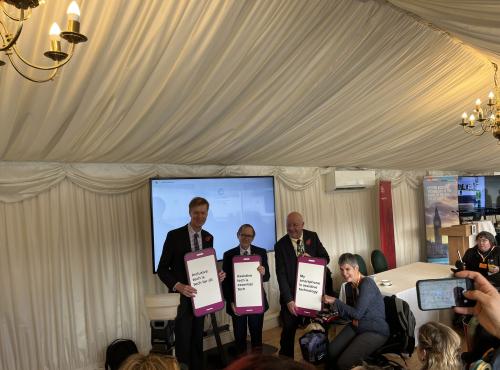Indoor Air Quality Policy Think-In round-up
In the midst of breathless build up to the 2024 UK General Election, Policy Connect marked the UK’s annual Clean Air Day with an ‘Indoor Air Quality Think-In’ to set the agenda for the next government’s action on clean air at home.
Featuring Baroness Natalie Bennett; the Stockholm Environment Institute’s Director Professor Sarah West; Clean Air Champion Dr Douglas Booker; Matt Towner of Impact on Urban Health; and indoor air quality expert Simon Jones, the panel aligned on how indoor air quality can receive due consideration in policy.
Baroness Bennett highlighted that indoor air quality significantly contributes to the poor levels of public health in the UK. However, it seldom features in discussions regarding ill health and its impact on productivity. This issue is exacerbated by the poor quality of housing in the UK. There is a growing need to adopt a preventative approach to public health, including access to clean air and proper ventilation in homes to protect against infectious diseases.
Matt Towner noted air pollution and poor indoor air quality underpin health inequalities in the UK and can devastate people’s health, especially in low-income areas. He called for the next government to introduce an ambitious new Clean Air Act, aligning with WHO air quality guidelines to make safe and healthy breathing a human right.
Professor Sarah West emphasized the need for the new government to show leadership by integrating climate change and air quality policies. Currently, no single government department is responsible for indoor air quality. A cross-departmental and cross-party approach is needed to address indoor air quality alongside outdoor air quality.
Simon Jones highlighted the need to effectively apply and enforce available knowledge to see improvements in air quality. Coordination is crucial and must involve all actors responsible for indoor environments, such as workplaces, educational institutions, hospitals, and industry. Third sector and industry organisations have gone beyond government policy to address indoor air quality and are well placed to support local authorities with any new clean air obligations.
The panel agreed lacking awareness and feelings of powerlessness are key impediments to change. The Government must provide actionable solutions and next steps, not just inform the public of the risks of poor indoor air quality. Maintaining clean air at home should not be a personal responsibility, as many factors are beyond tenants’ control. Therefore, a systematic response led by government is essential.
Lessons can be learned from other countries on tackling indoor and outdoor air quality issues. During the COVID pandemic, Japan installed outdoor air quality monitors displaying carbon dioxide levels. Across Europe, there are several best practice cases – France has an indoor air quality observatory, established over 20 years ago, that runs national campaigns to measure indoor air quality in homes, schools, offices, and other indoor environments. The next government must learn from global leaders in formulating its indoor air quality strategy.
The panel lastly aligned on the need to ensure public services and industry are equipped and skilled to bring indoor environments up to standards effectively. This upskilling must be coordinated, such that professionals helping to decarbonise homes can factor indoor air quality into their work.
Post-election, Policy Connect will continue its busy advocacy to ensure indoor air quality is given due prioritisation, and factored into all relevant policymaking.
For more information, please contact gaelan.komen [at] policyconnect.org.uk (gaelan[dot]komen[at]policyconnect[dot]org[dot]uk).



